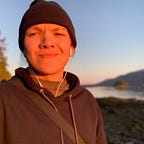Corbett alum develops Indigenous Walking Tour of UW — Canadian Studies Center
“You only have everything to gain when you surround yourself in a place that lets you critically engage in any way you want to.”
I ended ‘ Living in Place; an Indigenous Student’s Perspective Abroad ‘ with that sentence. I wrote the piece in October 2019, wrapping up the experience as an Indigenous person studying at the University of British Columbia (UBC). I left these words as a parting message for everyone, but I also left them to remind myself of how I’ve continued to critically engage with the studies and cultural imprints I gained on Musqueam territories that UBC rests on. While I was studying at UBC, I was constantly comparing the University of Washington (UW) to UBC and vice versa. However, it was immature for me to quickly come to certain conclusions without fully taking in the lived histories of both places. Even if these institutions are only 150 miles apart, they have vastly different colonial foundations and suppressions of Indigenous people. I came back to UW wishing that Seattle was more like Vancouver and that more people advocated for Indigenous voices and cultural settings like they did at UBC. I wrestled with that comparison, but ultimately learned that those thoughts discounted all the work that had been done in the territories that the UW resides upon, work of my peers, mentors, and ancestors. UBC allowed me to grasp inspiration to critically engage UW itself. Not with the UBC history and framework, but with UW’s own.
When I returned to the UW, I immersed myself in a project that had been in the works since the previous summer, as the lead student facilitator of the Indigenous Research Family with guidance of professor and Burke Museum curator Dr. Haakanson. This project focused on the UW framework, or shall I say the lack of, by having Indigenous students interact with the Burke Museum during a quarter, working on a project with their ancestral treasures. The inaugural group was great and centered on quarter winter 2020 and wrapped up in spring 2020 and will hopefully be continued after the pandemic with a different student facilitator. As the pandemic persisted, I moved back to Ketchikan, Alaska for the time being and lived with my family. With my newly allotted free time and my ongoing reflections of UBC, I was able to begin my newest project that showcased the Indigenous stories of UW in a small booklet, titled the ‘Indigenous Walking Tour of the University of Washington’, supported by grants from the Husky Seed Initiative and the Center for American Indian and Indigenous Studies. I’ve aimed to create a similar walking tour to UBC’s qeqən house post tour at UW that brings to life my studies, the Indigenous landscape of UW, as well as my own lived experiences of being connected to the Coast Salish land and my family history at UW. The Indigenous Walking Tour itself is going to be a 40-page, full color booklet that tells the story of Indigenous places through an Indigenous community member’s eyes across seven stops on campus. It’s less of a direct tour and more of an exploration of the Indigenous presence that often doesn’t get brought to light on campus through the lens of an Indigenous person. My goal with the Indigenous Walking Tour is to not only increase the visibility of Indigenous communities on campus, but connect the knowledge systems present on campus that critically engage Indigenous peoples. At UBC, I learned about the importance of holistic learning environments and teaching methods that encompass all studies and scholarly work. The Indigenous Walking Tour will remain a chapter in the Indigenous histories at UW and it’s my hope that it’s utilized in tours and classes across campus.
With my time at the University of Washington as an undergraduate coming to a close and my infinite reflections of UBC continuing, the study abroad I took as a Corbett Scholar will forever change my thinking and ways of preparing for the future. I didn’t know what to expect when I got there as I don’t know what to expect when I throw myself into the next new place ready to learn and connect with the lands and their peoples.
- Owen L. Oliver (Quinault/Isleta Pueblo)
-
The Corbett British Columbia-Washington International Exchange Program, housed at the Canadian Studies Center, Henry M. Jackson School of International Studies, provides an opportunity for undergraduate students at the University of Washington to spend two semesters at the University of British Columbia or University of Victoria; and for students from the University of British Columbia and University of Victoria to spend three quarters at the University of Washington. More information about the program and how to apply is available here.
Originally published at https://jsis.washington.edu on January 5, 2021.
